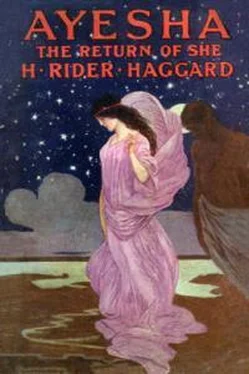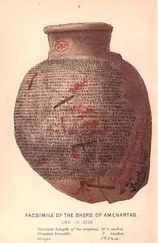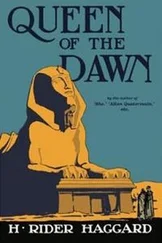The Hesea sat brooding on her rocky throne. She also knew that the hour had come. Presently she sighed, then motioned with her sceptre and spoke a word or two, dismissing the priests and priestesses, who departed and were seen no more. Two of them remained however, Oros and the head priestess who was called Papave, a young woman of a noble countenance.
"Listen, my servants," she said. "Great things are about to happen, which have to do with the coming of yonder strangers, for whom I have waited these many years as is well known to you. Nor can I tell the issue since to me, to whom power is given so freely, foresight of the future is denied. It well may happen, therefore, that this seat will soon be empty and this frame but food for the eternal fires. Nay, grieve not, grieve not, for I do not die and if so, the spirit shall return again.
"Hearken, Papave. Thou art of the blood, and to thee alone have I opened all the doors of wisdom. If I pass now or at any time, take thou the ancient power, fill thou my place, and in all things do as I have instructed thee, that from this Mountain light may shine upon the world. Further I command thee, and thee also, Oros my priest, that if I be summoned hence you entertain these strangers hospitably until it is possible to escort them from the land, whether by the road they came or across the northern hills and deserts. Should the Khania Atene attempt to detain them against their will, then raise the Tribes upon her in the name of the Hesea; depose her from her seat, conquer her land and hold it. Hear and obey."
"Mother, we hear and we will obey," answered Oros and Papave as with a single voice.
She waved her hand to show that this matter was finished; then after long thought spoke again, addressing herself to the Khania.
"Atene, last night thou didst ask me a question—why thou dost love this man," and she pointed to Leo. "To that the answer would be easy, for is he not one who might well stir passion in the breast of a woman such as thou art? But thou didst say also that thine own heart and the wisdom of yonder magician, thy uncle, told thee that since thy soul first sprang to life thou hadst loved him, and didst adjure me by the Power to whom I must give my account to draw the curtain from the past and let the truth be known.
"Woman, the hour has come, and I obey thy summons—not because thou dost command but because it is my will. Of the beginning I can tell thee nothing, who am still human and no goddess. I know not why we three are wrapped in this coil of fate; I know not the destinies to which we journey up the ladder of a thousand lives, with grief and pain climbing the endless stair of circumstance, or, if I know, I may not say. Therefore I take up the tale where my own memory gives me light."
The Hesea paused, and we saw her frame shake as though beneath some fearful inward effort of the will. "Look now behind you," she cried, throwing her arms wide.
We turned, and at first saw nothing save the great curtain of fire that rose from the abyss of the volcano, whereof, as I have told, the crest was bent over by the wind like the crest of a breaking billow. But presently, as we watched, in the depths of this red veil, Nature's awful lamp–flame, a picture began to form as it forms in the seer's magic crystal.
Behold! a temple set amid sands and washed by a wide, palm–bordered river, and across its pyloned court processions of priests, who pass to and fro with flaunting banners. The court empties; I could see the shadow of a falcon's wings that fled across its sunlit floor. A man clad in a priest's white robe, shaven–headed, and barefooted, enters through the southern pylon gate and walks slowly towards a painted granite shrine, in which sits the image of a woman crowned with the double crown of Egypt, surmounted by a lotus bloom, and holding in her hand the sacred sistrum. Now, as though he heard some sound, he halts and looks towards us, and by the heaven above me, his face is the face of Leo Vincey in his youth, the face too of that Kallikrates whose corpse we had seen in the Caves of Kor!
"Look, look!" gasped Leo, catching me by the arm; but I only nodded my head in answer.
The man walks on again, and kneeling before the goddess in the shrine, embraces her feet and makes his prayer to her. Now the gates roll open, and a procession enters, headed by a veiled, noble–looking woman, who bears offerings, which she sets on the table before the shrine, bending her knee to the effigy of the goddess. Her oblations made, she turns to depart, and as she goes brushes her hand against the hand of the watching priest, who hesitates, then follows her.
When all her company have passed the gate she lingers alone in the shadow of the pylon, whispering to the priest and pointing to the river and the southern land beyond. He is disturbed; he reasons with her, till, after one swift glance round, she lets drop her veil, bending towards him and—their lips meet.
As time flies her face is turned towards us, and lo! it is the face of Atene, and amid her dusky hair the aura is reflected in jewelled gold, the symbol of her royal rank. She looks at the shaven priest; she laughs as though in triumph; she points to the westering sun and to the river, and is gone.
Aye, and that laugh of long ago is echoed by Atene at our side, for she also laughs in triumph and cries aloud to the old Shaman—"True diviners were my heart and thou! Behold how I won him in the past."
Then, like ice on fire fell the cold voice of the Hesea.
"Be silent, woman, and see how thou didst lose him in the past."
Lo! the scene changes, and on a couch a lovely shape lies sleeping. She dreams; she is afraid; and over her bends and whispers in her ear a shadowy form clad with the emblems of the goddess in the shrine, but now wearing upon her head the vulture cap. The woman wakes from her dream and looks round, and oh! the face is the face of Ayesha as it was seen of us when first she loosed her veil in the Caves of Kor.
A sigh went up from us; we could not speak who thus fearfully once more beheld her loveliness.
Again she sleeps, again the awful form bends over her and whispers. It points, the distance opens. Lo! on a stormy sea a boat, and in the boat two wrapped in each other's arms, the priest and the royal woman, while over them like a Vengeance, raw–necked and ragged–pinioned, hovers a following vulture, such a vulture as the goddess wore for headdress.
That picture fades from its burning frame, leaving the vast sheet of fire empty as the noonday sky. Then another forms. First a great, smooth–walled cave carpeted with sand, a cave that we remembered well. Then lying on the sand, now no longer shaven, but golden–haired, the corpse of the priest staring upwards with his glazed eyes, his white skin streaked with blood, and standing over him two women. One holds a javelin in her hand and is naked except for her flowing hair, and beautiful, beautiful beyond imagining. The other, wrapped in a dark cloak, beats the air with her hands, casting up her eyes as though to call the curse of Heaven upon her rival's head. And those women are she into whose sleeping ear the shadow had whispered, and the royal Egyptian who had kissed her lover beneath the pylon gate.
Slowly all the figures faded; it was as though the fire ate them up, for first they became thin and white as ashes; then vanished. The Hesea, who had been leaning forward, sank backwards in her chair, as if weary with the toil of her own magic.
For a while confused pictures flitted rapidly to and fro across the vast mirror of the flame, such as might be reflected from an intelligence crowded with the memories of over two thousand years which it was too exhausted to separate and define.
Wild scenes, multitudes of people, great caves, and in them faces, amongst others our own, starting up distorted and enormous, to grow tiny in an instant and depart; stark imaginations of Forms towering and divine; of Things monstrous and inhuman; armies marching, illimitable battle–fields, and corpses rolled in blood, and hovering over them the spirits of the slain.
Читать дальше
Конец ознакомительного отрывка
Купить книгу












